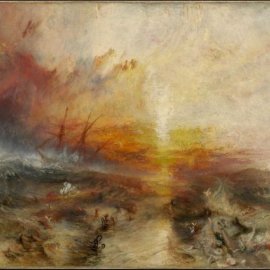Ocean Traffic
The ocean has served as a means of exchange for all manner of cargo: oil, chemicals, waste, arms, manufactured goods, raw materials, and human beings. In this episode of World Ocean Radio, host Peter Neill will discuss the slave trade, human trafficking, refugees, and the ways in which they have shaped our culture, economic structure, and values. ___________________________________________________________________________
Peter Neill, host of World Ocean Radio, provides coverage of a broad spectrum of ocean issues from science and education to advocacy and exemplary projects. World Ocean Radio, a project of the World Ocean Observatory, is a weekly series of brief audio essays available for syndicated use at no cost by community radio stations worldwide. Contact us for more information.
Image: Joseph Mallord William Turner, Slave Ship (Slavers Throwing Overboard the Dead and Dying, Typhoon Coming On), 1840. Museum of Fine Arts, Boston.
- Login to post comments



